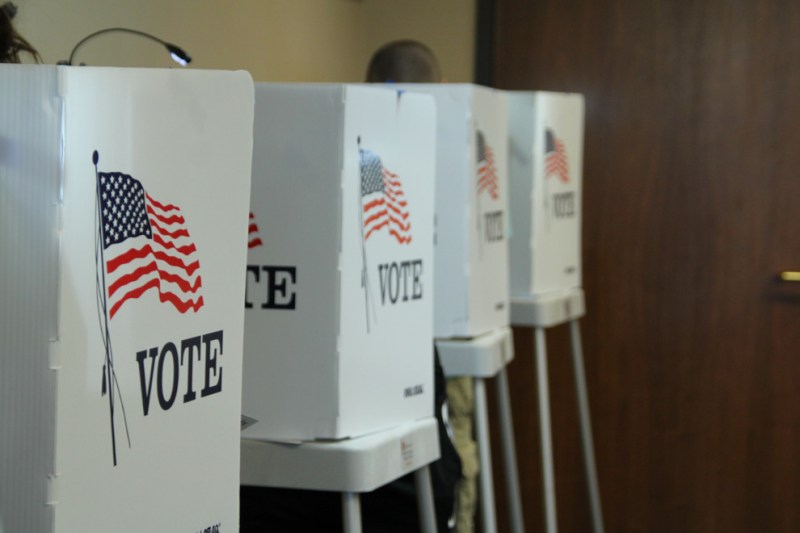When the polls opened today, Nov. 4, 36 Senate seats were on the ballot. The current Senate count is 55 Democrats and 45 Republicans, but most major news organizations and forecasters predict that the Republican Party is likely to regain the majority.
The outcome will depend on eight toss-up seats: Alaska, Colorado, Georgia, Iowa, Kansas, Louisiana, New Hampshire and North Carolina.
Alaska
In Alaska, the race is between incumbent Mark Begich (D) and challenger Dan Sullivan (R).
Sullivan has criticized Begich for his failure in his first term to pass legislation that benefits the state, while Begich has attacked Sullivan for decisions he made as the Commissioner of the Alaska Department of Natural Resources.
According to polling, Sullivan appears to have a slight lead, but Alaska is an historically difficult state to poll. This is a rare race in which the outcome will be unpredictable until the morning after voting occurs.
Colorado
Over the summer, incumbent Mark Udall (D) appeared successful in his attempt to undermine Representative Cory Gardner’s (R) campaign by attacking Gardner’s support for legislation that would restrict certain types of birth control.
But Gardner seems to have rebounded, and now looks to have the lead on Udall. Gardner was unexpectedly endorsed by the Denver Post, citing Gardner’s strong leadership and ability negotiate, pass bills and overcome gridlock.
Georgia
In Georgia, the race between David Purdue (R) and Michelle Nunn (D) has been a race to appeal to various racial populations. The winner will likely be determined by which candidate draws the significant Hispanic vote, and the race is predicted to end in a runoff.
Nunn has been distancing herself from Obama, as he is unpopular with the white voters in Georgia that Nunn needs to win.
Purdue, on the other hand, has been trying to win the approval of African-American voters since an event in March when he referenced his father’s role as a superintendent desegregating schools in the 1960s.
The so-called micro-targeting by the candidates is expected to ramp up if the vote goes to a run-off.
Iowa
The Iowa race between candidates Bruce Braley (D) and Joni Ernst (R) is also polling at almost an even split.
Braley’s campaign has been punctuated by a series of gaffes from himself and other members of the Democratic Party, including a video posted last week from a Democratic barbeque that shows outgoing Senator Tom Harkin (D) comparing Ernst to Taylor Swift and Mr. Rogers, implying that voters are only voting for her because she’s attractive and nice.
Kansas
In Kansas, Pat Roberts (R) is facing Independent Greg Orman. The campaigns have been a bit unique as the candidates don’t fall onto the traditional Republican/Democratic ideological lines: Democratic nominee Chad Taylor withdrew from the race in order to avoid splitting the non-Republican vote. However, Roberts attack ads criticize Orman for connections to the Democratic party, attempting to undermine his label as an Independent.
The anti-abortion group Kansas for Life has been very actively supporting Roberts, hoping to mobilize the large Christian population in the state.
Orman is basing his hopes on his merits as a centrist candidate, saying he will work to overcome partisan gridlock in the Senate.
Louisiana
Louisiana incumbent Mary Landrieu (D) and challenger Representative Bill Cassidy (R) are both preparing for a potential run-off campaign.
If Georgia and Louisiana go to run-offs, both wins are predicted to go to the Republicans, as both races feature distant third party candidates (Tea Party candidate Rob Maness in Louisiana and Libertarian Amanda Swafford in Georgia). Supporters of the third party candidates will likely support the Republican candidates in that no candidate will receive over 50 percent of the vote, thus forcing a runoff.
New Hampshire
Incumbent Jeanne Shaheen (D) is facing Scott Brown (R), who previously lost a Senate seat in Massachusetts to Elizabeth Warren in 2012. Polling data shows that Shaheen has a slight lead over Brown, but New Hampshire politics have been notoriously volatile in recent years.
Both Brown and Shaheen are emphasizing improving veteran services and lowering energy costs. In a debate in October, Brown took a moderate stance on climate change that diverges from the Republican party line, which denies that climate change is man-made.
North Carolina
In North Carolina, incumbent Kay Hagan (D) is facing Thom Tillis (R). Hagan looks to have a slight lead despite a low approval rating at the end of her last term. CNN has the race polling within the margin of error.
Tillis was Speaker of the House in North Carolina when the House passed a new law restricting voter eligibility. The law enacted changes including ending same day registration and requiring voter ID starting in 2016, and has been criticized for discriminating against minorities.
President Barack Obama sponsored Hagan in a last minute radio ad, drawing criticism that Hagan is trying to draw the African-American vote.
California Races
The most anticipated race in California is for the non-partisan position of Superintendent of Public Instruction. Incumbent Tom Torlakson is being challenged by Marshall Tuck, the founding CEO of the Partnership for Los Angeles Schools. The race is being touted as a reform candidate, Tuck, versus a union candidate, Torlakson.
Torlakson says he will focus on delegating decision making to local sources instead of state government, providing real world career training in schools and improving school safety.
Torlakson’s main endorsements are the California Teachers Association and the California Nurses Association.
Tuck is endorsed by Sacramento Mayor Kevin Johnson, the San Francisco Chronicle and the Los Angeles Times.
Torlakson and Tuck differ in opinion over the recent California Supreme Court decision in Vergara v. California that struck down teacher tenure and seniority statues.
Torlakson disagrees with the decision, arguing that the statutes in place didn’t violate California’s Equal Protection Clause. Tuck agreed with the court’s decision, and has indicated that if he is elected he will initiate reforms that are similar deviations from the status quo.
Contact Katie Zingheim at zingheim ‘at’ stanford.edu.
